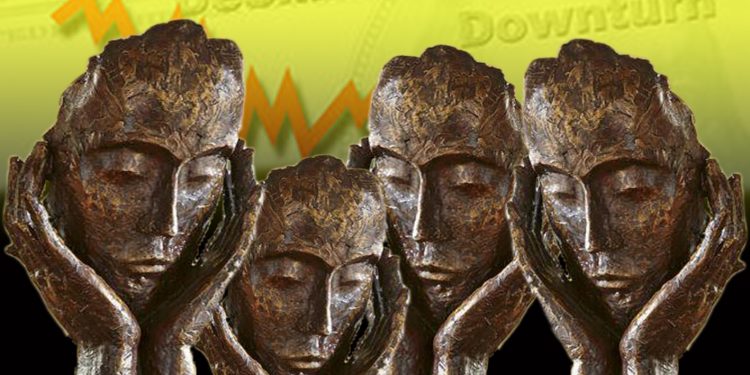P Gargi Rao
Declining growth rates, a stagnating automobile industry, and mounting non-performing assets in banks leading to loss in consumer confidence have all caught the eyes of economists, analysts and the media in India. ‘Recession cycle’ and ‘growth slowdown’ are among phrases that have repeatedly caught the common person’s eye in recent times. But it is not clear if the current state of the economy is a recession, a slowdown or the effects of structural reform kicking in? Against this backdrop, let us try to understand the current dynamics of Indian economy.
To start with, let us understand recession. It is a downturn in GDP growth rate, or negative growth rate for three consecutive quarters. Investment and consumer demand may fall, production will slow down and unemployment will mount.
Slowdown, in turn, is a situation in which GDP growth slows but does not decline. To be more precise, it is the slowing of economic activity owing to a fall in productivity of employees. In economics, recession is part of the business cycle where growth rate begins dipping and could be accompanied by rising unemployment. Prolonged recession leads to depression, which will have a greater global impact.
In the Indian scenario, we can see that GDP growth rates are falling. According to the Reserve Bank of India (RBI) growth rate in the last financial year closed at 6.8 per cent and hit an all-time low of 5 per cent in the second quarter of FY 2019. The scenario is similar globally too. Advanced economies such as the US, China and UK experienced slowdown in growth from the second quarter. Rising oil prices and international political scenarios lead to such global slowdown.
The major reasons why Indian investors, economists and analysts saw a recession coming are as follows: fall in consumer demand; the invisibility of ‘ease of doing business’; and stagnation of sales in the automobile industry, which could be an offshoot of the rise in oil prices and unemployment
Is it really a recession? From February 2019, growth rates of the Indian economy have been slowing, but they have not been in negative values. We, therefore, cannot actually term it as recession. India is in a quasi-recession period. Production has declined owing to deficiency in demand. The RBI responded by following a cycle of interest rate cuts.
The major reasons why Indian investors, economists and analysts saw a recession coming are as follows: fall in consumer demand; the invisibility of ‘ease of doing business’; and stagnation of sales in the automobile industry, which could be an offshoot of the rise in oil prices and unemployment.
Other challenges could be traced from the fiscal front. This year’s budget included bold measures such as Pradhan Mantri Kisan Samman Nidhi (PM-KISAN) (providing direct cash transfers to small and marginal farmers); Ayushman Bharath (health insurance coverage up to Rs 5 lakh per person), Pradhan Mantri Shram Yogi Maandhan Yojana (pension scheme for unorganised workers), Make in India, among others; all these schemes are draining the revenue pool hugely. This made fiscal deficit shoot up and cross limits of the Fiscal Responsibility and Budget Management Act targets of containing fiscal deficit at 3 per cent. Added to this, Goods and Services Tax (GST) collections have gone down owing to non-performance of the industrial sector and deficient demand at the grass-roots level.
These challenges in the economy push our mental faculties to believe a recession is ahead of us. But in reality it is merely a slowdown. For recession to occur, growth rates have to fall continuously and even become negative at some level. Recessions set in mostly where there is an adverse demand shock and mounting unemployment. But from the Indian perspective, demand is deficient but it is not an adverse demand shock. Now the question is, are these changes in GDP growth rate the result of reforms in the economy?
Since 2014, India has embarked on a structural reform journey. Reforms such as demonetisation of 500- and 1,000-rupee notes to curb black money, introduction of GST, merger of Public Sector Banks (PSBs), among other things, have been implemented. These have brought up new challenges to which the economy is currently adjusting to. Amid all this, the finance minister announced that India will achieve the target of becoming a $5-trillion economy by 2024. It seems bizarre that when the economy is on a growth path it will keep growing at a pace, no matter what, but the timeline of growth may differ as a result of new policies. Adding to this, data reveal low GST collections, revenue loss for the Centre and states, and fiscal decentralisation uncertainty (which will be known when the Fifteenth Finance Commission submits its recommendations). In a way, these reforms are causing growth to slow down.
The government, along with the RBI, is taking measures to revive growth rates. Steps such as Asset Quality Review of Non-banking Financial Companies (NBFCs), banks; BASEL norms for maintaining capital adequacy; merger of banks to pool risks; interest rate cuts to infuse liquidity; focus on strengthening judiciary to complement ease of doing business; special policies aimed at factors of production in the economy; focus on climate change and creating conducive environment for higher production; and cut in corporate taxes, to make India competitive in global arena to attract Foreign Direct Investment (FDI) are all being implemented to revive the growth rate.
But, ‘What is to come next?’, is a question that both the government and the RBI have to answer in the coming quarters to revive growth rates. To put it simply, measures to heal the wound have been initiated. But it is ambiguous whether the change in GDP growth rate owes to recession, slowdown or reform. Macroeconomic parameters such as inflation, interest rates, current account deficit, fiscal deficit and taxes have to be aimed at to boost economic growth. Growth is set to revive, but at a slower pace.
The writer is a development economist and an alumna of London School of Economics.






































